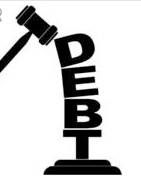If you can’t pay a debt, creditors are willing to settle out of court with you for a lump sum payment of less than the amount you owe, or a monthly payment plan, but they also will not hesitate to sue you for the full amount of the money you owe them.
So what should you do if you receive a summons and complaint from a creditor? Answer it.

What Happens If You Do Not Answer the Complaint
If you choose not to answer the complaint, the Court will enter a judgment against you, determining that you owe the creditor whatever amount they asked for. You may even be told to pay their attorney fees. The creditor can then use that judgment to garnish your wages, take money from non-exempt bank accounts or put a lien on your property.
If You Do File An Answer
If you answer the complaint (and you usually have about 20 days to respond to the plaintiff’s claims), you preserve your right to be able to argue your position in Court. You also will be notified of any future Court dates. You can use your time in Court to state why you don’t owe the money they claim.
What If You Do Owe the Money they Claim
Even if you do know for sure that you owe the exact amount the debtor claims, you can still use your time in Court to state another amount that you can afford to pay. Although typically if you admit you that amount, you will receive a judgment against you for said amount. The real leverage comes simply by answering. The debtor does not want to appear in Court no more than you do. They simply want to get paid. Once they see how time-consuming this may become for them since they are not receiving a default judgment, they may be more willing to enter a settlement agreement with you.

Debtors will take you to court for their money
What If You Don’t Have the Money to Pay?
It doesn’t matter if you don’t have the money. The debtor can still sue and the Court can still enter a judgment against you. Being broke is not an excusable reason to back out of your financial responsibilities, as the debtor is willing to shake the money out of you if it could. In cases like that you might just want to consider filing for bankruptcy instead. However, if in your financial statement and affidavit you can show how you don’t have the funds to pay, nor have a steady income, the debtor may be more willing to negotiate with you for a settlement plan.
What If You Offer to Make Monthly Payments?
A debtor does not have to enter into a payment plan with you. They can reject your offer and then sue you for the full amount. A debtor is more likely to reject a payment plan if they believe you have the means to pay, you have wages they can garnish, property they can attach a lien to, or a bank account they can raid. It is often, however, in the debtor’s financial interest if they reach a settlement plan with you if you don’t have the means to pay.

Try to settle a debt
Negotiate Your Debt
You’re in a better position to negotiate your debt before you stop making payments. However, if you’re receiving debt collection notices, that means you’ve already stopped. So, the older your debt gets, the better your chances are to get a good deal on a lump sum payment. At some point some creditors may have “written off” your debt as a bad debt expense. If they’ve written it off but then you come to offer to make a payment, they should be willing to take almost any amount from you, as any amount is better than no amount. If you’re offering a lump sum, try offering one-quarter or one-third of what you owe. Be careful with offering a monthly payment plan. Because if you miss a payment, the clock can start all over again for the full amount of the debt you owe.
If you need further guidance, sign up for a free consultation about how you can improve your financial situation.
RELATED ARTICLES
Free Financial Guidance
Statute of Limitations on Debt
You Can Stop Debt Collector Harassment
5 Tips if You’re Facing Court Action from a Debt Collector








You must be logged in to post a comment.